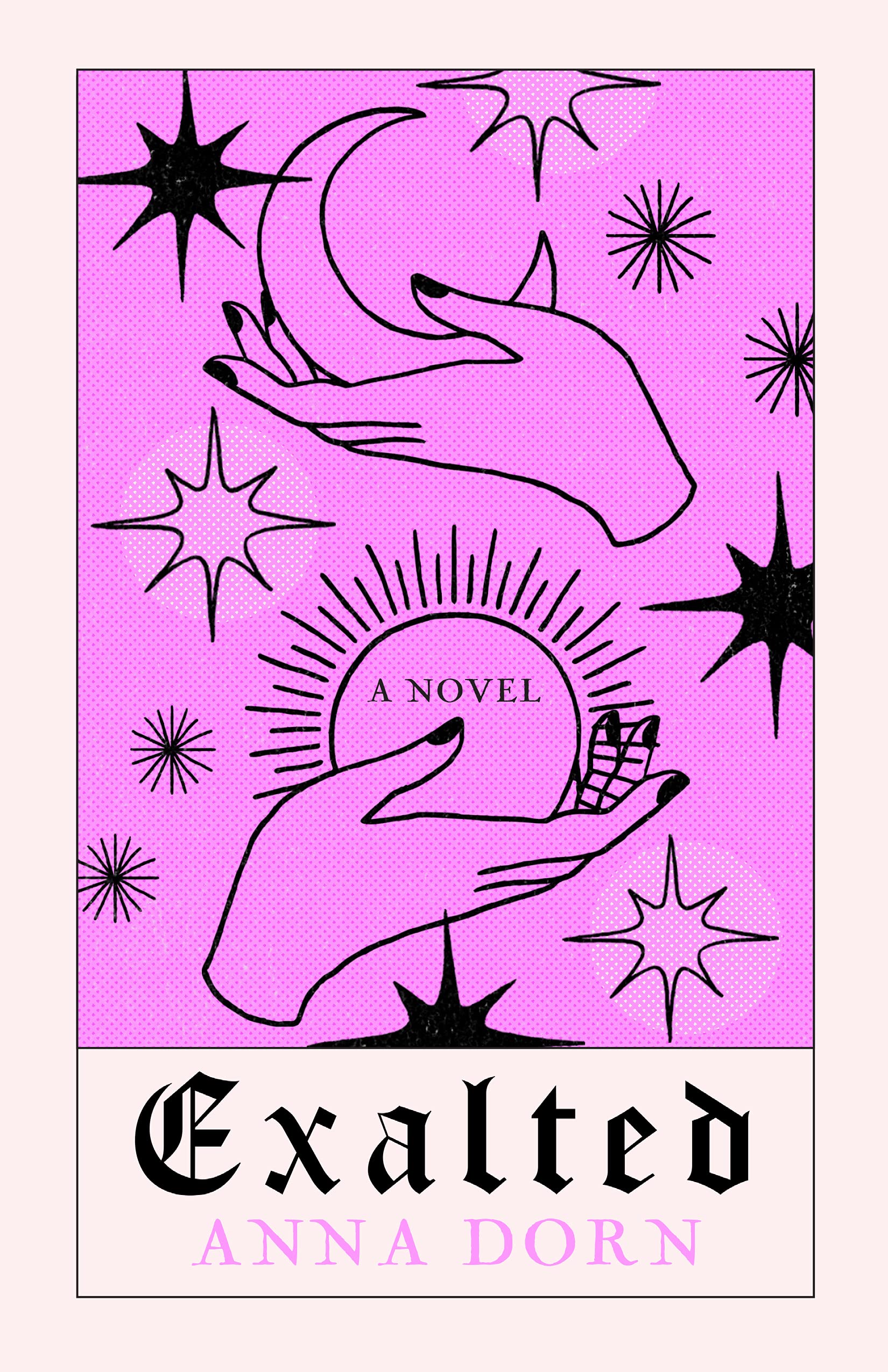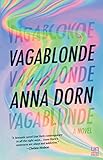 When I graduated from my MFA program, I got a job as a barista at a coffee shop. One of my first shifts was with a Gen Z-er with a septum piercing, who, upon meeting, immediately asked my sign. I said I was a Taurus sun with a Leo moon and rising, which I’ve heard means that I secretly like attention. At this time, I was listening to the audiobook recording of Anna Dorn’s Vagablonde, which follows a Los Angeles attorney who embarks on an endless bender with a manic music producer. The novel’s spiky humor resonated at this moment in my life, so I was thrilled to learn that the subject of Dorn’s next novel, Exalted, was astrology.
When I graduated from my MFA program, I got a job as a barista at a coffee shop. One of my first shifts was with a Gen Z-er with a septum piercing, who, upon meeting, immediately asked my sign. I said I was a Taurus sun with a Leo moon and rising, which I’ve heard means that I secretly like attention. At this time, I was listening to the audiobook recording of Anna Dorn’s Vagablonde, which follows a Los Angeles attorney who embarks on an endless bender with a manic music producer. The novel’s spiky humor resonated at this moment in my life, so I was thrilled to learn that the subject of Dorn’s next novel, Exalted, was astrology.
A dual-perspective story, Exalted follows Emily and Dawn, two women in Los Angeles whose lives, relationships, and finances are on the brink of collapse. Emily runs a meme account, charging suckers to read their charts. Dawn stans her account. Incisive and sardonic, written with razor-ship wit, Exalted asks what we believe in and how these systems fail us. I spoke with Dorn, a former criminal defense attorney, about celebrities, astrology, and lesbian pulp novels.
Michael Colbert: Exalted resides in the same universe as Vagablonde. How did you make that decision, and how did you figure out how much these worlds would collide?
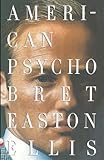
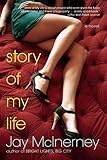 Anna Dorn: When I first started writing, I was influenced by Bret Easton Ellis and the literary Brat Pack. I loved how Ellis had certain characters like Clay and Blair and Sean Bateman who appeared in multiple novels. And in American Psycho, Sean’s brother Patrick Batemen kills Alison Poole, a character in Jay McInerney‘s Story of My Life. The literary Brat Pack has its own fictional universe and I wanted to do something similar. I think it’s really fun for readers.
Anna Dorn: When I first started writing, I was influenced by Bret Easton Ellis and the literary Brat Pack. I loved how Ellis had certain characters like Clay and Blair and Sean Bateman who appeared in multiple novels. And in American Psycho, Sean’s brother Patrick Batemen kills Alison Poole, a character in Jay McInerney‘s Story of My Life. The literary Brat Pack has its own fictional universe and I wanted to do something similar. I think it’s really fun for readers.
MC: Are there other stories you want to tell within this world? How does this version of California interact with the one you inhabit?
AD: Around the time Exalted came out, I was listening to the Mamas & the Papas song “California Dreamin’” on repeat. When Vagablonde came out, I was replaying Lana Del Rey‘s “Freak.” Baby if you wanna leave / come to California, be a freak like me, too. I grew up on the East Coast yearning for California, where there was no winter and no Ivy League and everyone seemed sun-kissed and cool. California is filled with dreamers, people looking to escape or renew, seeking freedom or stardom. This environment thrives on delusion, which my first two novels are about.
MC: California is one of those places that feels so mythologized in literature, film, music, and art. I love the vision of LA in this book: everyone’s into astrology, Emily completes her readings at Subtropical where all the waiters are hot. I’m loath to ask because I think the “New York story” conversation feels so tired, but how do you carve out space for yourself in writing such a written about place?
AD: It’s an irritating trait, but I’m a contrarian who loves an underdog. I was a criminal defense attorney for a reason. California is so ignored by the literary scene, I simply have to set my books here. I also obviously find it inspiring, Los Angeles in particular. The weirdos and palm trees, lizards and strip malls, dramatic landscapes and dramatic people. It’s pretty but precarious, glamorous but also abject. I can’t imagine writing a book that takes place anywhere else.
MC: What’s your relationship to celebrity? I loved Pru’s Lana obsession in Vagablonde, and Emily is similarly fixated on Winona Ryder. What do we learn from celebrities? What do their lives offer us? How do they fail us?
AD: Celebrities are religious for me, I think. There’s a reason I’m always calling them “icons.” I don’t want to meet Lana or Mary Kate or Rihanna or Kanye, because that would make them people, and I don’t want them to be people. I want them to represent all that is glamorous and pure. Celebrities represent potential in the same way California does.
MC: Also, can we talk about Lana? Are you a fan? What drew you to her?
AD: I’m a Lana superfan! Major. Lana and I are both East Coast girls who went West to make art that mythologizes California. I fell in love with Lana from the second I saw the video for “Video Games,” which is filled with dreamy Californian iconography—tall palms and skaters and paparazzi footage of Paz De La Huerta falling down drunk. Then Lana had what was deemed one of the worst SNL performances of all time and it was game over for my contrarian ass. Lana told Rolling Stone she thought she “looked beautiful and sang fine” and “there’s a backlash about everything I do.” It’s true, Lana’s always attracting hate and controversy. She’s a major troll. She dated a cop at the height of BLM. She wore a dress from “the mall” to the Grammys. She’s always showing up at 12-step meetings all over Los Angeles. Beyond all that, I truly believe she’s the best living songwriter. She has the most evocative voice. Lana’s songs make me cry and laugh and feel like I’m having a nervous breakdown at the Chateau Marmont. She’s perfect.
MC: In Exalted , Emily uses astrology as a way to (sort of) make a living giving people what they want. Lies and delusions are essential to this novel. Astrology and Freud collide. These prisms through which they interpret the world also have consequences; people project and lie to each other, and this becomes a powerful engine for plot. How would you consider this novel as an examination—or trial—of belief?
AD: I’m definitely pro-deluding oneself. I wouldn’t be a novelist if I couldn’t lie to myself. Belief has its flaws but it’s better than the alternative. When I was younger, I was horny for nothingness, but I’ve soured on nihilism. I like to think the universe is protecting me.
MC: There’s some cosmic dramatic irony at play in Exalted. Do you think the universe has Emily and Dawn’s backs in the end?
AD: I do! It’s hard to answer this question without giving too much away, but to be vague: both characters go through hell to get to where they need to be. I think that’s how life works. Things seem terrible and hopeless but then five years later we look back and are like: okay, I get why that happened.
MC: While Emily projects stories onto people through astrology, another significant force of projection in the novel is the internet. You’ve said that one of the kernels for this novel was the distortions of the internet, how it speeds everything up, like with online dating. We see this at play with Dawn and Emily’s storylines. How do you approach the internet, either with writing or personally?
AD: Writing about the internet feels inevitable for me. I live online and my characters live online. I love the internet’s dramatic potential. People tend to be both more effusive and crueler over digital communications than in person. I love the tension between how my characters see themselves and how they portray themselves online. My protagonist Emily has a good relationship with social media. Unlike most of us making content for free to benefit Mark Zuckerberg, Emily sees social media as merely a tool to exploit for her financial gain. I wish I were more like her.
MC: One concept that I see a lot in the discourse is a call for messy gays in literature—LGBTQ characters who get to make mistakes and do “bad” things. How do you understand your protagonists? How do you react to this call among readers and writers?
AD: I’m actually working on a new novel which is an ode to the lesbian pulp of the 50s—male gazey camp that had to end tragically or else it might be censored as an attempt to “proselytize homosexuality.” It was considered problematic by more self-serious feminists, but I think it’s fun, very messy. Being gay does give you a sort of freedom to be messier because you’re already a disappointment to your parents, so why not go off? I’m deeply bored by the idea of a sincere coming out story or an “it gets better” narrative. Does it get better? I think it just gets different.
MC: I’m so excited to hear about this new novel! How are you reimagining the genre today? What does it offer you as you write?
AD: I’m leaning into the camp of the genre, but having my main character narrowly escape ending up in her own lesbian pulp novel. The novel is essentially about a woman escaping the historic trappings of lesbian melodrama to accept real intimacy as she enters into mid-life.
MC: You’ve previously said anger is a good motivator for your humor. What was getting you angry when you wrote this book? What’s on your mind now?
AD: I was in a period of heavy drinking and drug use when I wrote my first two novels, which meant that I was coming down a lot which made me irritable. I was also angry that my career wasn’t where I thought it should be. I felt like a failure and a loser. I felt like I worked too hard to be so unsuccessful. Now I’m more at peace with my mediocrity. I feel lucky to have legs that work. And I make much healthier lifestyle choices—I take Omega 3 supplements, and I’m on a new antidepressant.
MC: Finally, were there any important influences for you as you worked on this novel? Who are you reading these days?
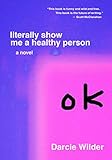
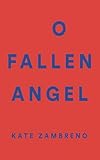
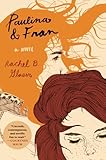
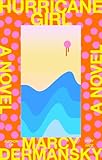
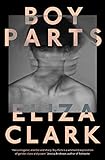 AD: While writing Exalted, I was also inspired by the films of Sean Baker, Euphoria, Darcie Wilder’s Literally Show Me a Healthy Person, Kate Zambreno’s O Fallen Angel, Rachel Glaser’s Paulina & Fran, and the Red Scare podcast. Recently I’ve also been inspired by Marcy Dermansky‘s Hurricane Girl, Eliza Clark‘s Boy Parts, Mae Martin‘s Feel Good, Olivier Assayas‘s Irma Vep, the Honestly podcast with Bari Weiss, and my girlfriend Vanessa Roveto‘s poetry. She just wrote her first novel which I love and am basically just trying to copy.
AD: While writing Exalted, I was also inspired by the films of Sean Baker, Euphoria, Darcie Wilder’s Literally Show Me a Healthy Person, Kate Zambreno’s O Fallen Angel, Rachel Glaser’s Paulina & Fran, and the Red Scare podcast. Recently I’ve also been inspired by Marcy Dermansky‘s Hurricane Girl, Eliza Clark‘s Boy Parts, Mae Martin‘s Feel Good, Olivier Assayas‘s Irma Vep, the Honestly podcast with Bari Weiss, and my girlfriend Vanessa Roveto‘s poetry. She just wrote her first novel which I love and am basically just trying to copy.
